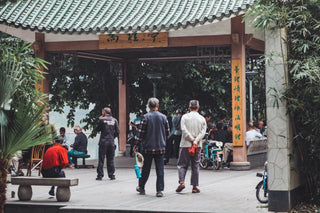You’ve probably seen it: in China, right after dinner, the streets fill with people taking slow, steady walks. Grandparents, parents, kids. No one’s in a rush. It’s not a workout — it’s a ritual.
In Traditional Chinese Medicine (TCM), walking after dinner isn’t just about getting your steps in. It’s about helping your body do what it does best: digest, circulate, and settle into rest. Think of it like giving your gut a gentle nudge and saying, “You’ve got this.”
It’s all about the Spleen (yes, really)
In TCM, the Spleen is your digestive powerhouse — and she does not like to be overwhelmed. A big dinner? Heavy emotions? Cold drinks? She needs a little help. A slow post-meal walk gets Qi (your body’s energy) flowing, supports the Spleen, and keeps everything moving without overdoing it.
You don’t need to hike a mountain. Just a 10- to 20-minute stroll will do.
No, it’s not just for old people
Even Western studies now say walking after eating helps regulate blood sugar, supports digestion, and improves sleep. But TCM knew this long ago. In fact, there’s an old Chinese saying: "Take 100 steps after a meal and live to 99." It’s not a joke — it’s preventive medicine with sneakers on.
Your digestion works better in motion
When you sit or lie down right after eating, your Qi gets stuck — which can lead to bloating, gas, or that sluggish, sleepy feeling. Walking gives your Stomach and Spleen just enough movement to process your meal more efficiently. It’s like a warm-up… but for your insides.
How to do it the TCM way:
· Wait 10–20 minutes after eating before heading out.
· Walk slow— this isn’t cardio.
· Skip the phone and feel your feet on the ground.
· Notice your breath.
Walking after dinner might seem like a small thing — but in TCM, small things done consistently are what keep your body in balance. So the next time you finish your evening meal, resist the couch (or the phone scroll). Step outside. Breathe. Let your Qi stretch its legs.
Your Spleen will thank you.





